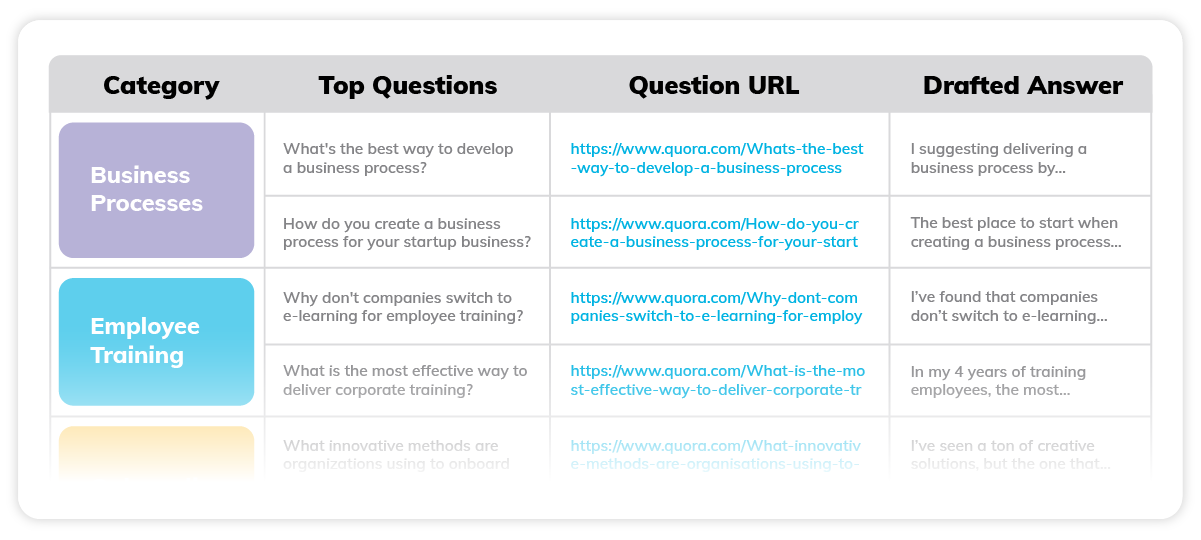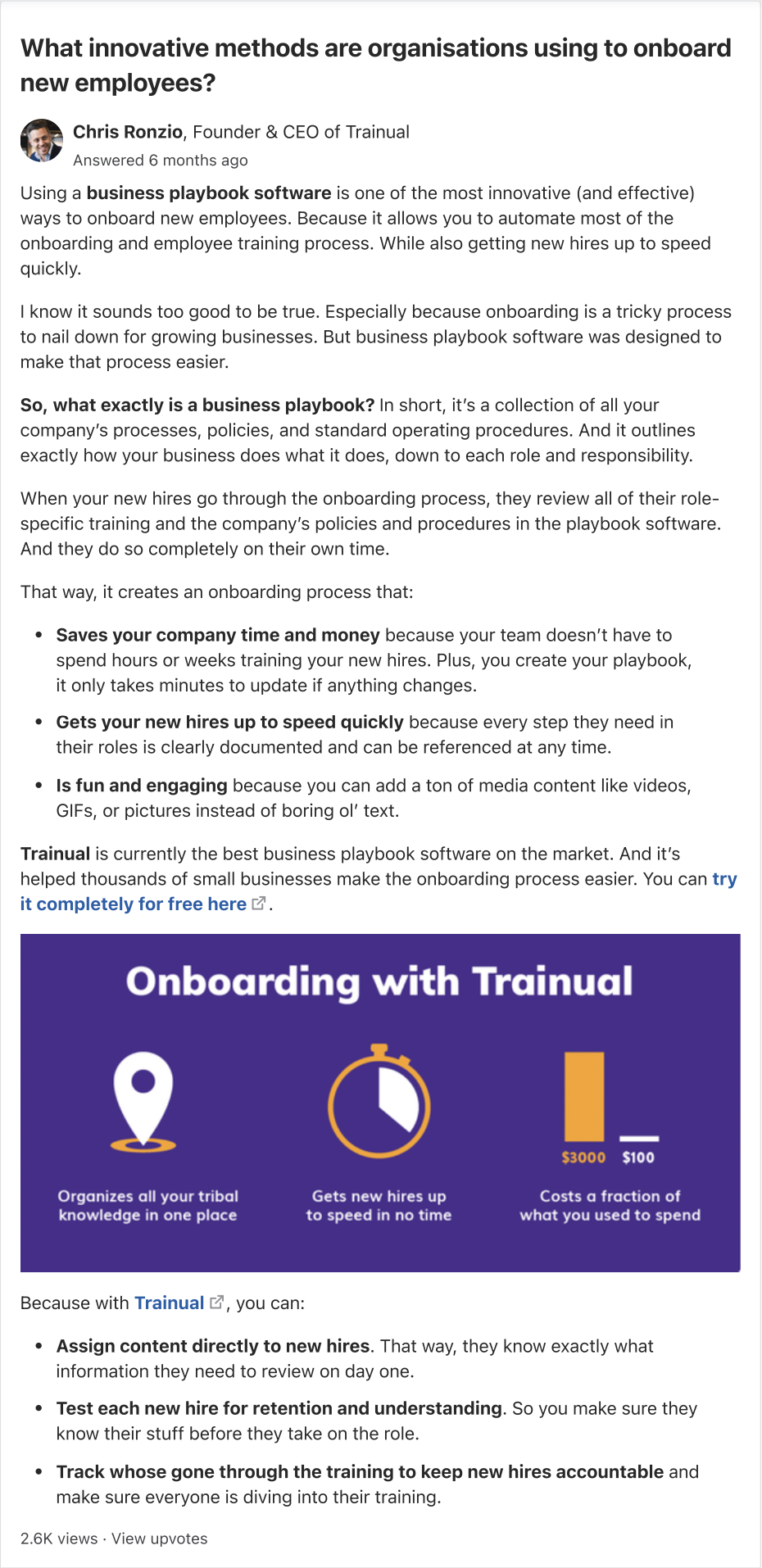
Articles
How To Add Quora To Your Marketing Strategy
November 3, 2021

What sounds like a better marketing strategy: interrupting someone scrolling social media with your ads? Or talking to someone who is actively searching for the solution that your company solves?
If you're like us, it's the latter! (Okay, we actually do both.) But the people already looking for your solution are the warmest leads because you know they need a product or service like yours ASAP. And often, they'll turn to Quora (the Q+A social media platform) to find that solution.
By answering their questions on Quora, you can position yourself as an expert in the community. And ultimately create a ton of raving fans for your company.
Don't believe it? I'm part of the team that implemented this tactic into Trainual's marketing strategy. And our Quora answers got 500k+ views in 3 months. So, I want to share our secrets with you to help you get more eyeballs on your business!
🔥 Tip: If you use this strategy, document it in Trainual. That way, anyone on your marketing team can learn the process and expand your reach. Try for free.
What is Quora?
Quora is a Q+A website where people can ask questions on any topic and receive answers from other people. How it works is super simple: someone posts a question. Then, anyone can jump in and answer. Kind of like Yahoo! Answers. (Throwback, right?)
But even before someone posts a question, they can search if anyone else has asked that question already. That way, they can get their answers immediately and don’t have to bother asking themselves.
You may be thinking: “Why not just Google the question?” But with Quora, you can get personalized, intimate answers from the top experts in their field. As opposed to generic articles or high-level search results.
For example, some users you may know on Quora are Facebook COO Sheryl Sandberg and Mark Cuban. And their answer is probably worth way more than the top search result on Google.
But the tool becomes a powerful marketing tool when your business becomes that expert. For example, Deel answers questions that have to do with managing a global payroll. All because they’ve helped a ton of clients who have that same problem. So, by showing they know their stuff, they prove they are the expert (and make the soft push that their software is the solution).
Why should you add Quora to your marketing strategy?
For starters, there are about 300M monthly active users on Quora. And these users are way more intentional about why they’re visiting the platform than other social media sites. Meaning, they go to Quora to find a specific answer to a specific question. Whereas Facebook users and Instagram users log on to scroll. AKA you’ll have to work harder to get (and keep) their attention!
And because people who use Quora are more intentional, they’re way more likely to “go down the rabbit hole” by clicking on your site. The stats prove this: the average visit time for Quora is about 4 minutes per day. Whereas Facebook’s average is nearly 19 minutes. Meaning, they’re likely spending more time on the external links they find on Quora than the actual site itself. And since your endgame is to get users to your site, this is a huge win!
Plus, it’s a great way to position yourself as an expert on the web. Because when you’re consistently providing great answers to questions in your area of expertise, people will know that you and your business are the go-to places for their needs. And since the site covers over 400k+ topics, chances are high that your most knowledgeable areas are there.
But does it actually work? Sure does!
In fact, Quora reports that businesses that advertise on the platform have seen up to 4x higher conversions than other social media platforms. All because of their users’ intent to find a quick solution to their problems.
Quora marketing best practices (and things to avoid)
Before you dive into marketing on Quora, there are a few ways to make sure you get the best results. I tested a ton of strategies on Quora to find the ones that consistently work.
So, we’re breaking all of the best practices down for you here. Complete with examples of how we use Quora to market our own business!
1. Set your profile up for success
After creating your profile, the first thing you need to do is make it stand out from the rest. Because when you're posting answers, the first thing people will want to know is if your answer can be trusted. AKA if you have the credibility to back it up.
And chances are good that your business has this credibility! But you have to make it known. So, when deciding what name to connect with the profile, pick the CEO, CMO, or anyone who is your company's "face."
👉 Quick note: For most situations, Quora doesn't allow brands to have accounts. They only allow people to have them. So, you'll have to put a name and a face on your profile no matter what.
Then, make sure your profile shows you have the authority. This can be as simple as "CEO of [company]." Or you can put your results instead, such as "has helped thousands of [your target customer] do [the result you help them get].
For us, our CEO and Founder, Chris Ronzio, is the face of our Quora account. And since we help small businesses scale and grow, we thought it was fitting to keep it to "Founder & CEO of Trainual." That way, people know that they're getting scaling advice from a CEO of another growing small business.

2. Find the best questions to answer
The best questions to answer are the ones in your business’s niche or industry. AKA where your credibility is actually, well, credible. And you’ll get bonus points if you can do this: answer questions where your business is the best solution to what they’re asking for!
So, for example, if you are a real estate agency, try to answer questions related to selling a home, buying a home, or finding a great realtor.
But here’s the catch: you need to find questions that give your answers the best chance of being seen. For instance, if you answer a question that already has over a thousand responses, your post will likely get lost and no one will see it.
So, prioritize answering questions that do the following:
- Tons of followers. Ideally, try the ones that have over 50 followers. Because if someone follows a question, they’ll get notified whenever someone answers. Plus, it proves that it's a hot topic that people actually search for. The bigger the following, the better the question.
- A high follower-to-answer ratio. Meaning, if there are more followers than answers, it’s a prime question to answer. Because you have a better chance of your response being seen by the followers. The sweet spot is 5:1 (followers:answers) or better.
- Several really bad answers. If you find a question and the answers make you think, “I can answer this way better,” that’s a good sign. The same goes if none of the answers have upvotes or comments because that means other users agree with you. Consider this your open door invitation to drop knowledge bombs on them!
The good news is that finding these questions is super easy. All you have to do is search for key terms within your industry in the search bar and then look through each question. From there, pick the questions that fit at least one of the criteria above.
When we started our Quora strategy, our marketing team sifted through questions with at least one of the above criteria in the onboarding, small business, employee handbook, and training niches.
Here’s an example of two questions that came up when we searched for “employee handbook.”
Question 1: What is the purpose of an employee handbook
- Followers: 2
- Answers: 12
- Upvotes on the top answer: 6
Question 2: What is the best way to maintain a startup culture while having an employee handbook?
- Followers: 8
- Answers: 4
- Upvotes on the top answer: 1
Out of these two questions, we prioritized answering Question 2. That’s because it had a higher follower-answer ratio, lower upvotes on the top answer, fewer current answers, and more followers in general.
And the results proved it was a great move. We snagged over 350k views and 139 upvotes on our answer.
Once we gathered all of the questions we wanted to prioritize, we put them in a spreadsheet to stay organized. Plus, it helped us to prioritize each answer from the newer list we gathered.

3. Write the best answers
No, duh! Just like finding the right questions, you want to make sure you create the right answers. And it goes way beyond just giving them the solution to what they’re looking for.
So, open up a Google Doc and draft out your answers there. And as you do that, use the below criteria to write home-run answers:
- Don’t write short answers. People are looking for a useful solution with actionable advice on Quora. That means the best answers will need a bit of detail. Deepak Shukla, a Quora expert who went from 0 to 20M views on the site, suggests writing 300-1,000 words.
- But write short paragraphs. Meaning, roughly 3 sentences per paragraph (max). This makes the answer easier to read and more likely to be read. Because people might shy away if there are huge blocks of text in the answer because just looking at it will give them information overload.
- Add pictures, bulleted lists, and bold the key points. Again, this makes it way more readable and skimmable. Kind of like what we’re doing here with these points (wink).
Once the answer is written, you can preview how it looks in Quora before you post it. And we highly recommend you do! Because if it looks good, people will be way more likely to dive into the answer.
Here’s an example of an answer we posted to give you an idea of what the formatting looks like:

4. Ditch the pitch and focus on value
As excited (and right) as you are to pose your business as the solution - resist the urge to make your Quora answers a sales pitch! People will know you’re just trying to sell them something (especially if your business’s name is in your profile). And that will turn them off.
Not to mention that Quora will kick you off their platform if you make too many hard sells. Because it goes against their terms and conditions.
The only exception to this is if someone is asking, “what’s the best product or service for [insert the problem you solve here].” But even if that’s the case, you don’t just want to answer with “my business!” Because it’s going to make your answer seem less genuine and more like a shameless plug.
Instead, lead with value. Meaning, educate the person on the best way to approach their problem first. And include all of the actionable steps, explanations, and best practices that will genuinely help the person (even if they don’t buy your product or service). Then, make your pitch at the end.
For example, we answered the question: “What innovative methods are organizations using to onboard new employees?”. And it would have been easy to just tell them that Trainual is the answer.
While that’s not wrong, we didn’t go that route. Instead, we started with:
Then, we went into how to use a playbook software and what problems it could be helpful with solving. Once we did that, we finally made the pitch that Trainual is the best business playbook software on the market. (Don’t worry, G2 has proof to back it up). But only after we added value first.
5. Get your team to upvote the answers
Now that you've posted your answers, you want to ensure they are front and center! Because just like Google Search results, people are more likely to read the answer that's on top. And the good news is that there's a way you can game this.
Quora users can upvote or downvote answers (just like Reddit). The more upvotes your answer gets, the higher it'll be placed on the question relative to others. So, as soon as you post the answer, figure out how to guarantee upvotes. That way, you'll maximize the number of views and clicks you get on your answers.
A great way to do this is to have your team help out! AKA ask them to go and upvote your answers. And if you really want to go the extra mile, you can ask your raving fans who already use and trust your product. You can even have them comment on your answers to show even more credibility.
When Chris's answers went live for us, we sent a message to our marketing team's Slack channel and asked everyone to upvote the answers. As a result, all of our answers moved up in position on the site (some of them even reaching #1).
Of course, if you write great answers and provide useful content, other users will naturally upvote your answers. So, if you keep that as your top-of-mind focus, not only will you have the best answers on Quora, but you'll also have a brand new way to bring more customers into your business.
Similar Blog Posts











